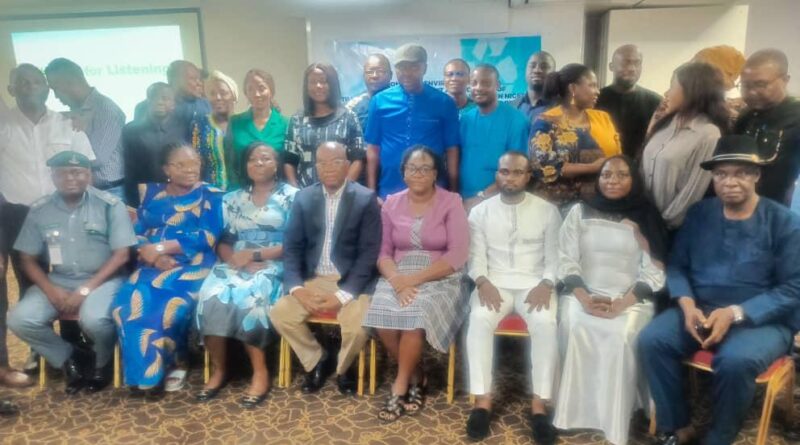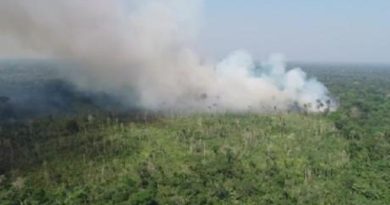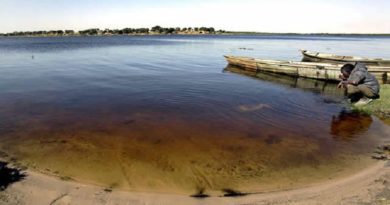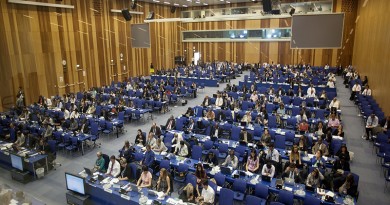Nigeria: How BCCC Africa is championing environmentally sound management of plastic waste
Photo caption: Group photograph of participants at the day-long project closing/validation workshop held in Lagos on Thursday April 25,2024.
When in 2022, the Basel Convention Coordinating Centre for the African Region (BCCC Africa) commenced a project titled “Promoting environmentally sound management and control of transboundary trade of plastic waste in Nigeria, through inventory and stakeholder mapping,” little did one knows that Nigeria has an estimated annual production rate of 2.5 million tonnes of plastic waste.
Two years down the line, the estimate of the total quantity of plastic waste generated in the country, the inventory of plastic waste in the country has been established.
Challenges such as insufficient legislation, ineffective institutions, incomplete inventory data, and low public awareness, inadequate local recycling facilities, unlawful garbage imports and inadequately processed plastics, inadequate training programmes for law enforcement, insufficient funding sources, and a deficiency in source reduction/elimination tactics were adduced for ineffective management of plastic waste in the country.
At the core of these challenges surrounding plastic waste management is the lack of inventory data.
The project is in line with policy related actions that were outlined in the national policy for plastic waste management.
Speaking at the closing/validation workshop organised in Lagos, BCCC Africa’s Executive Director, Professor Percy Onianwa, said that having run the project to its concluding stages, the forum was to discuss the findings with stakeholders.
Various presentations were made by the team from BCCC Africa and consultants on the project.
Professor Onianwa told newsmen that the forum was a closing workshop and was associated with a project that commenced two years ago in which BCCC Africa purposed to estimate the total quantity of plastic waste generated in the country.
He said: “This is what we regard as the inventory of plastic waste in the country. We started it in 2022.
“We have used a methodology involving a toolkit that was developed by the BRS. We call it the BRS-NORAD toolkit. It was first applied in Ghana. We also applied it in Nigeria to gather some data from different parts of Nigeria on plastic waste generation, plastic waste management. We applied all that data into the toolkit to generate information about the total quantity of plastic waste generated in Nigeria. It is not only information about the total quantity of plastic waste that we gathered. We gathered many other information about plastic waste disposal, the amount of plastic waste that is recycled, the amount of plastic waste imported and exported, all of which can be very valuable for planning how to manage plastic waste.”
Onianwa, a professor of Chemistry at the University of Ibadan, spoke further on the significance of the project on proper plastic waste management.
He said: “It is very important that we manage plastic waste well because of the hazards of plastic waste that are very well known globally, and Nigeria is not an exception.
“You cannot manage a problem if you don’t understand or know the magnitude of that problem. To manage plastic waste properly, you first have to carry out an inventory.”
He also spoke on the progress made regarding stakeholder mapping. He went further, “In addition to the inventory, we have developed a platform to bring stakeholders together who are involved in plastic waste management. We are creating a website that we use to list persons involved in plastic waste management in the country. We will use it to generate and engender interaction among the stakeholders; we will use it to provide information on a continuous basis and update the list of those involved in plastic waste management.”
Speaking generally on waste management in the country, the Executive Director of BCCC-Africa, said: “The government is doing its best. But there is very high level of ignorance or lack of awareness on issues pertaining to waste, both on how to recycle or use waste in a circular manner and also on what constitutes hazardous waste.
“Some wastes are hazardous and need to be disposed of in a specific manner. So, it is important that individuals understand this and are able to support government. There is a behaviour problem in the way we deal with waste. Sometimes it is individuals that are not behaving well. Sometimes it is that the facilities for proper disposal are not provided!”
Professor Onianwa hinted that while stakeholders gathered at the closing workshop in Lagos, the fourth session of the Intergovernmental Negotiating Committee to develop an international legally binding instrument on plastic pollution, including in the marine environment (INC-4), was ongoing in Canada.
It concluded with an advanced draft text of the instrument and agreement on intersessional work ahead of the fifth session (INC-5) in November.
He said at the inception of the project in 2022, that the project “will provide a solid support of valuable inventory data upon which other activities and projects can be effectively built.
“Some international partner agencies such as UNIDO, World Bank, GPAP, GIZ, are already proposing to support Nigeria in tackling its plastic waste management problem. Our project will provide fertile ground for germinating further interventions in Nigeria.”
The project is granted by the Secretariat of the Basel, Rotterdam and Stockholm (BRS) Conventions under its Small Grants Programme (SGP) on Plastic Waste.
Funding was obtained by the BRS Secretariat from the Norwegian Agency for Development Cooperation (NORAD)
The overall aim of the project is to promote environmentally sound management of plastic wastes in Nigeria through activities that provide solid base and data for further interventions. The project is built to provide reliable data on local plastic waste generation rate, and plastic waste trade (import/export); and to create a database of local stakeholders involved in the lifecycle of plastics management in Nigeria.
According to Onianwa, these outcomes would contribute to effective control of transboundary movement of plastics, environmentally sound management of plastics, and tackling sources of plastic waste.
In a bid to achieve a sound national management of plastic waste, Nigeria recently created a national policy for plastic waste management under the Federal Ministry of Environment. It was determined that the following key policy-related actions should be carried out during the 2019 stakeholder engagement to verify the draft policy document: creating an inventory, educating stakeholders, creating standards, and creating funding plans.




